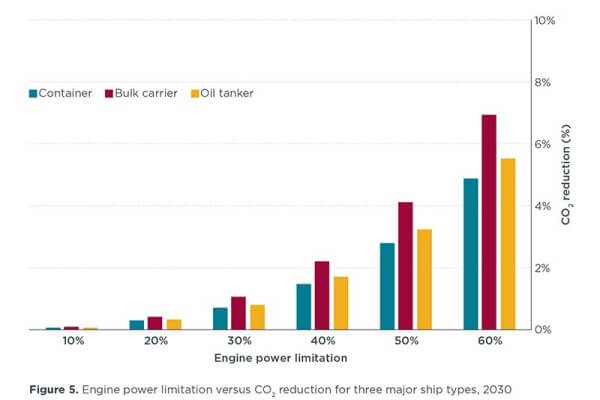Limiting Engine Power to Reduce CO2 From Existing Ships
10
As the International Maritime Organization works to reduce greenhouse gas emissions from international shipping, technical measures to limit engine power are among the ideas being considered to reduce carbon dioxide (CO2) from the existing fleet. Engine power limitation (EPL) is a semi-permanent, overridable limit on a ship’s maximum power that could reduce fuel use and CO2 emissions if it reduces the operational speeds of affected vessels.

This study models the relationship between varying levels of EPL and CO2 emissions based on 2018 real-world ship operations. The authors find that CO2 reductions are not proportional to engine power reductions because ships are already operated well below their maximum speeds and therefore engine powers. EPL scenarios below 30% provide negligible cuts in CO2 for the 2018 fleet, while a 30% EPL is estimated to reduce CO2 by 2% for container ships and oil tankers, and 3% for bulk carriers. Larger, 50%+ EPL could more meaningfully reduce ship CO2 by 8%–19% depending on ship type and size.
Additionally and importantly, benefits diminish over time if EPL is not required for newer ships due to fleet turnover and growth. As illustrated in the figure below, by 2030, EPLs of 30% or less would reduce fuel use and CO2 emissions by 1% or less, while the maximum 60% EPL scenario would cut emissions by about 6%. By comparing a Base scenario with a High Speed scenario, the authors find that EPLs of 30%+ in 2030 could help lock in the fuel savings of existing slow steaming practices by constraining future speed increases.
Other Articles
Carbon Capture Utilisation & Storage (CCUS) In 2026
16
Global Underground CO2 Storage Data Offers Hope Amid Rising Emissions
01
IMO Postpones Adoption Of Global Net-Zero Shipping Framework
04
Pioneering Carbon Capture Projects Ready For Construction
03
Methanol & Ammonia Deemed Ready As Zero-Emission Shipping Fuels
01
Carbon Capture Storage Reaching A Turning Point In Decarbonisation
13
CCS To Capture 15% Of Shipboard Carbon Emissions By 2050
29
Global Shipping Industry Struggles To Navigate Net Zero Transition
21
Carbon Capture Surges as Economics Policy & Industry Demand Align
14
GHG Emissions At Ports On The Rise Despite Initiatives
07
